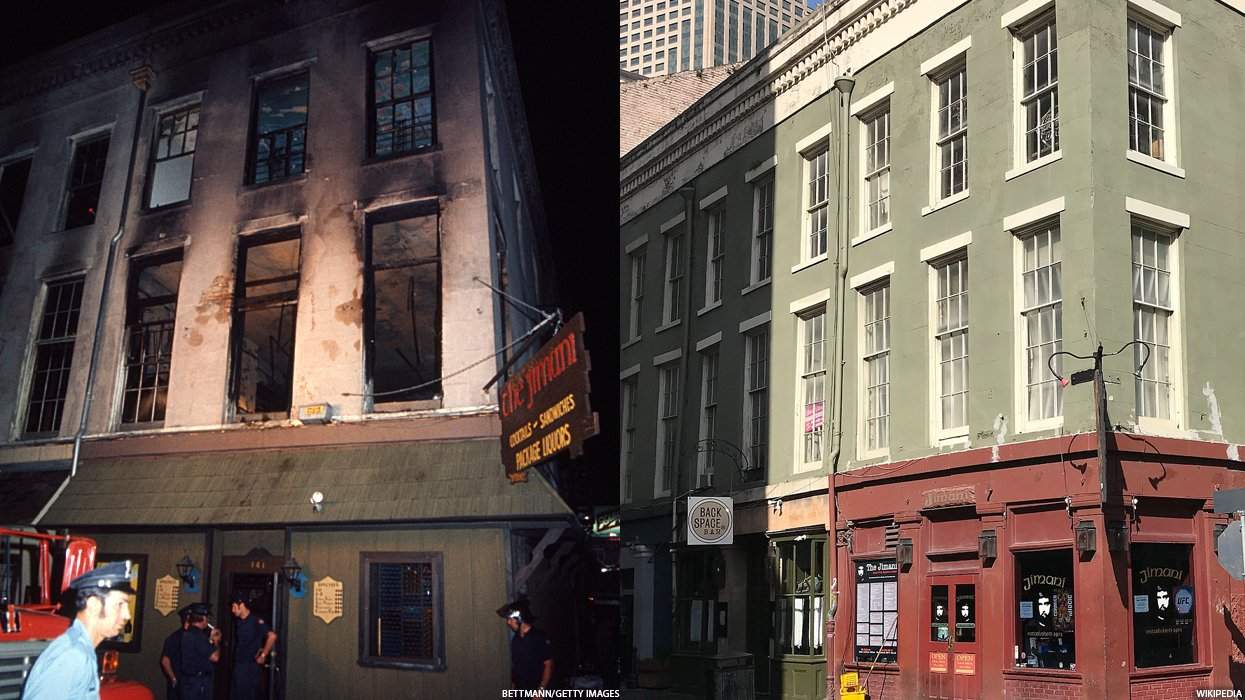Fifty years ago, 32 people died in what was once the deadliest attack on the LGBTQ+ community in U.S. history. On the evening of June 24, 1973, an arsonist torched the entryway into the Up Stairs Lounge in New Orleans, setting off a catastrophic blaze that quickly ate up the stairway leading up to the bar before consuming the establishment itself.
Sundays at the Up Stairs Lounge were the biggest nights thanks to its beer bust. From 5 to 7 p.m. you could buy a pitcher of beer for a pretty cheap price. Up Stairs was a working-class bar for working-class gay men and lesbians. More than 100 people could easily gather there during its beer bust.
The identity of the arsonist has never been confirmed, and no one was arrested in connection with the fire. However, a known patron had been kicked out of the bar early in the day. While he was leaving, survivors of the fire recalled him saying something along the lines of threatening to set the place ablaze. Witnesses saw him buy lighter fluid at a nearby Walgreens.
He allegedly threw the container in front of the stairwell that went to the entrance to the bar and ran.
As journalist and author of Tinderbox: The Untold Story of the Up Stairs Lounge Fire and the Rise of Gay Liberation Robert Fieseler explained to The Advocate, the fire initially was contained in the stairs until the door to the bar was opened, causing something like a tidal wave of fire to crash into the lounge. Survivors said it was like “a fireball or something shot from a cannon,” according to Fieseler.
A bartender by the name of Buddy Rasmussen was able to shepherd some patrons to another building through a secret door. However, because of the suddenness of the fire and the obstruction to victims’ senses it caused, many didn’t hear him. Instead, they broke through the windows only to find bars preventing their escape. Some people were able to make their way through the bars but were burned by the metal they were made of. Others were cornered by the flames.
“A lot of people describe hearing the screams of the individuals once the flames reach the far corner as the worst thing they've ever heard,” Fieseler said.
The fire was put under control in less than 30 minutes. But it was too late for many.
Twenty-nine people died that night. Three others died from their injuries in the days after. About a third were military veterans, according to local experts.
While at first the fire was making news and people generally were horrified by what happened, as soon the queer identity of the space was revealed, New Orleans went cold on the fire.
“The tragedy didn’t get the attention it deserved 50 years ago, and there are still a lot of people in New Orleans and elsewhere that don’t know about it,” said Frank Perez, who was one of the lead organizers around the 50th-anniversary event held June 24-25.
In fact, Fieseler told The Advocate that the prime suspect was even apprehended by Rasmussen after the fire, but police didn’t investigate as they should have or believed Rasmussen at the time.
“It was an intentionally set fire, and then in the wake of that intentionally set fire those murdered were then wiped from the slate of history,” Fieseler said. “They existed in a society that forced them to live invisibly in this semi-closet of existence, such that they had to seek comfort, friendship, camaraderie in havens like the Up Stairs Lounge bar.”
The fire is still the deadliest in New Orleans history, but the Pulse massacre has now become the deadliest attack on LGBTQ+ people in the U.S.
Last year, the city of New Orleans issued an official apology. Perez and other local historians and advocates say the police have a duty to also apologize for the lack of proper investigation.
"The city we are today is not the city we were then," Councilmember J.P. Morrell said in a statement at the time. "The City of New Orleans' lack of response to the deadliest fire in our history has kept individuals from mourning their loved ones, but today we took a step in the right direction.”
Thanks to books and documentaries about the fire, more people have become aware of what happened. However, there are still issues around the fire that haven't been resolved.
One such thing is that three of the victims were buried in unmarked graves. While two of the three remain unidentified, the third is Ferris LeBlanc, a World War II veteran who fought in the Battle of the Bulge and in Normandy.
Most of his family didn’t know he was a victim of the fire until 2015, LeBlanc’s nephew Skip Bailey said. LeBlanc’s family has been trying to get his body exhumed since then but to no avail.
Bailey sees the anniversary to not only remember his uncle but to think about the issues LGBTQ+ people face today.
“Now it's even more important to continue to fight for the equality of everybody,” he said. “And this anniversary brings up [the Up Stairs Lounge fire] and keeps the whole fight in the forefront of everybody's mind.”





































































Charlie Kirk DID say stoning gay people was the 'perfect law' — and these other heinous quotes